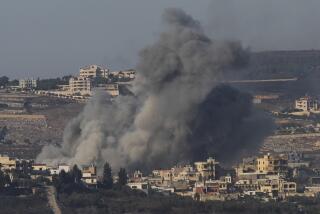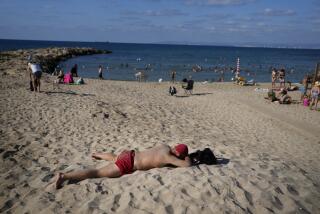Bethlehem in Palestinian Hands, as Skepticism Vies With Cheers
BETHLEHEM, West Bank — Palestinian police donned crisp uniforms and T-shirts emblazoned with eagles, piled into their dented trucks and set off Wednesday, with sirens whining and lights spinning, to take back the streets from Israeli soldiers.
Bethlehem was the second chunk of land given back this week under a peace plan known as the “road map.” If all goes as planned, the rest of the West Bank cities will soon follow.
Israelis are nervous that the gradual easing of the military clampdown on Palestinian territories -- beginning with the Gaza Strip and Bethlehem -- could open the Jewish state to a resurgence of suicide attacks and shooting rampages. Those fears were fed Wednesday when four Jewish settlers were reportedly injured in the Gaza settlement of Kfar Darom after antitank missiles were fired from nearby Palestinian areas.
In Bethlehem, jubilant Palestinian security forces staged a sort of victory parade through the sloping streets. Schoolgirls in pigtails, old women in housecoats and slumped men lined the route, waving from the shadows. The bells in Manger Square clattered in celebration, and even the aging priests limped forward to watch the commotion with bearded grins.
But the cheer was shot with skepticism. Israeli soldiers still bound the city with a tight ring of checkpoints and patrols, and stood watch over Rachel’s Tomb, a revered shrine of Jewish worship within Bethlehem.
Israel gave the streets over to about 100 Palestinian officers -- but, aside from regular patrols, Israeli soldiers had long since pulled out of the city’s ancient hub. Bethlehem’s municipal leaders dismissed the changing of the guard as cosmetic, and called for Israel to dismantle the army checkpoints on the outskirts of town.
“Inside the city, we are free,” said Abu Mahmud, a Bethlehem police commander. “Outside Bethlehem,” he said tersely, “we hope they will leave.”
That isn’t likely. Thick lines of traffic piled up behind an Israeli army checkpoint on the road between Bethlehem and Jerusalem, cradled by sunburned hills of olive groves.
Suzanne Amerzian, 40, sat idle in the harsh sun, four of her children fussing in the back seat of her van.
The Jerusalem family has been trying for three months to make the arduous drive to visit Amerzian’s aging mother, who lives behind the army barricades in Bethlehem.
“Every time we come here we end up having to go back,” said Amerzian, who sat waiting for her turn to be questioned by Israeli soldiers. “Today we’ve been here for an hour.”
Dozens of soldiers stood guard in a camouflaged observation tower, behind high walls and loops of barbed wire.
They said they didn’t expect to pull out -- Israelis live in dread that a Palestinian attacker will slip out of Bethlehem and sneak a few miles north, into Jerusalem.
“This is the protection of Israel here,” said a soldier who didn’t give his name. “There’s no way we’re leaving.”
Israeli leaders have said they are willing to hand the rest of the West Bank cities to Palestinian security patrols -- but first, Palestinians will be expected to illustrate their eagerness to protect Israel by rounding up illegal weapons, thwarting attacks and jailing militant leaders. Gaza and Bethlehem are supposed to be a proving ground: Now that Palestinians have at least some measure of control, they’ll be under stiff pressure from the United States and Israel to launch a campaign against militant resistance groups such as Hamas and Islamic Jihad.
“We need to set clear demands and a timetable,” Public Security Minister Uzi Landau told Israel Radio.
“A date when they’ll start confiscating the illegal weapons, a date when they’ll outlaw Hamas, a date when they’ll start to arrest -- and throw the terrorists in jail.”
Israeli intelligence agents have been preparing a list of Palestinian prisoners they deem appropriate for release. Freedom for thousands of men and women locked up in Israeli camps is a continuing demand of the Palestinian street.
Now the Palestinians must do something soon to appease an edgy Israeli public, a Western diplomat said Wednesday, but it was unclear whether the Palestinian security forces have yet made any arrests -- or even how they plan to go about their jobs.
“We’re going to collect weapons and make sure nobody threatens Israel in the streets,” said Maj. Gen. Ismael Jaber, commander of the Palestinian security forces in the West Bank.
But the Palestinian forces have been hit hard. Many police officers were arrested or killed fighting the Israelis, their facilities bombed to rubble and their vehicles destroyed. Some of the officers came in battered vehicles Wednesday, but most of them came on foot -- there aren’t enough trucks to carry them. Afterward, they returned to the bombed-out hulks of their former offices.
Action by the Israeli army continued. Early today, the army said it shot dead a senior member of the Palestinian group Tanzim and arrested another in the West Bank city of Kalkilya.
When the Palestinian officers got the news that Bethlehem was theirs at 4 o’clock in the afternoon, as promised, the upper echelon of the security forces gave its men permission to pick up their guns -- banned until now -- and don their uniforms.
The troops took winding paths to Manger Square, savoring the long way through the hills and the giddy salutes from Palestinians who peered from bullet-riddled doorways. A young boy in dungarees dangled his feet from the base of a statue in an abandoned square, pumping a peace sign at the passing parade.
Sunlight clung to everything as the officers passed the old walls, which were smeared with graffiti and adorned with torn posters of the Palestinian “martyrs” who died in the uprising and the spray-painted icons of militant groups.
Raids and retreats have washed in and out of this city since the Palestinians rose up 33 months ago to demand statehood. Bethlehem’s economy, culture and morale have been diminished. This isn’t the first time Israel has pulled out of Bethlehem -- and many residents were certain that it wouldn’t be the last.
“When the Israeli soldiers want to come in, they’ll come -- the Palestinian police won’t stop them,” said Nasim Hajaj, a 22-year-old taxi driver. “This is just fun and games. In fact, we’re under army occupation.”
“We want a real country,” he said, “and we want to be free.”
More to Read
Sign up for Essential California
The most important California stories and recommendations in your inbox every morning.
You may occasionally receive promotional content from the Los Angeles Times.










